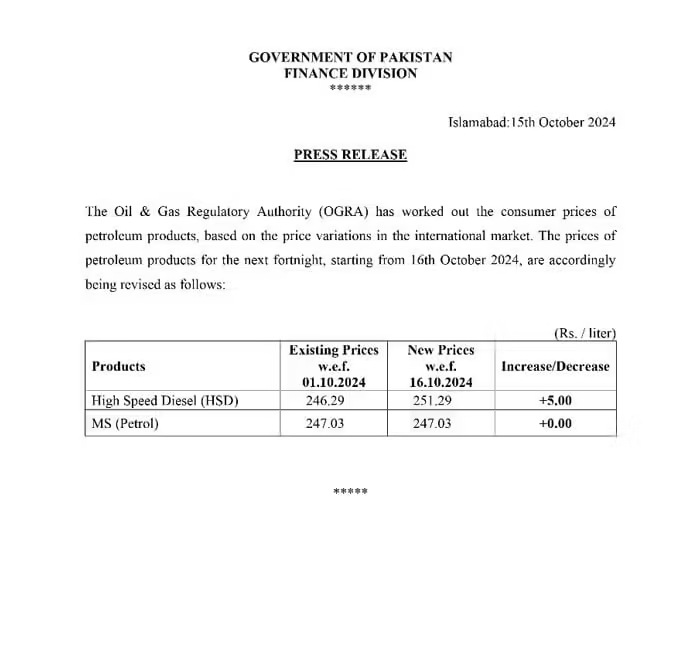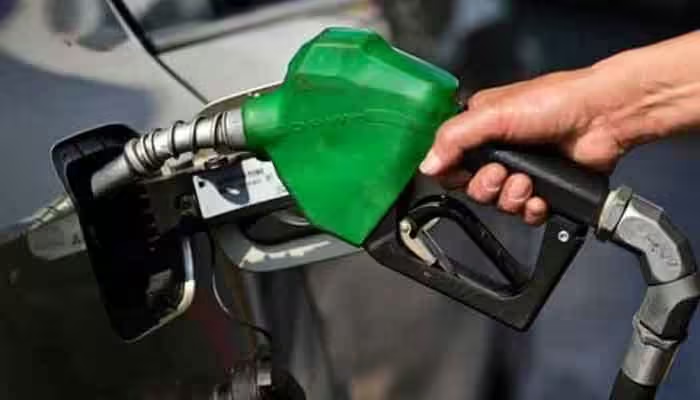In its latest revision of petroleum prices, the government has announced adjustments that will affect the cost of high-speed diesel while keeping petrol prices unchanged. These new prices are set to take effect for the next 15 days, in line with the regular fortnightly reviews. The Ministry of Finance issued the notification detailing the updated rates, which reflect a Rs 5 per liter increase in the price of high-speed diesel, while the price of petrol remains constant.
High-Speed Diesel Price Hike
As per the notification, the price of high-speed diesel has been increased by Rs 5 per liter, bringing the new rate to Rs 251.29 per liter. This increase comes at a time when diesel is widely used across various sectors in Pakistan, including transportation, agriculture, and industry. Diesel powers heavy vehicles such as buses, trucks, and agricultural machinery, making it a critical component of the country’s economic engine.
The rise in diesel prices will likely have a ripple effect on transportation costs, which could indirectly increase the cost of goods and services, especially in areas reliant on heavy transport. Furthermore, the agricultural sector, which is highly dependent on diesel-powered machinery such as tractors and water pumps, may face increased operational costs, impacting farmers and potentially contributing to higher food prices.
No Change in Petrol Prices
While the price of diesel has been adjusted, the government has opted to keep petrol prices steady at Rs 247.03 per liter. This decision may provide some relief to consumers who rely on petrol for their daily commutes and personal vehicles. Petrol is the most commonly used fuel for cars and motorcycles in Pakistan, so any changes to its price can directly impact a large segment of the population.
By maintaining the price of petrol, the government is likely aiming to balance the need for revenue generation with the potential burden on consumers who are already grappling with inflation and the rising cost of living. The stable petrol price might also be seen as a move to maintain public satisfaction, especially among urban commuters who are more reliant on petrol-powered vehicles.
Reasons Behind the Price Adjustment
The periodic revision of petroleum prices is typically based on several factors, including international oil prices, exchange rate fluctuations, and domestic considerations such as taxes and levies. The increase in diesel prices reflects the impact of these variables, particularly the rising cost of crude oil in the global market.
In recent months, international oil prices have been volatile, largely influenced by geopolitical tensions, global supply chain disruptions, and varying demand in major economies. Pakistan, which imports a significant portion of its petroleum products, is directly affected by these fluctuations. The devaluation of the Pakistani rupee against the US dollar further exacerbates the impact of rising international oil prices, as the cost of importing fuel becomes more expensive.
The government must also consider the fiscal pressures it faces, including meeting revenue targets and managing the fiscal deficit. Taxes and levies on petroleum products are a significant source of revenue for the government, and adjustments in prices can help in revenue generation, especially in times of economic strain.
Impact on the Economy and Consumers
The increase in diesel prices will likely have both direct and indirect consequences for the economy and consumers. As diesel fuels the transportation of goods across the country, any hike in its price is expected to increase the cost of transportation. This, in turn, could raise the prices of essential goods, including food and other household items, making life more expensive for the average Pakistani.
The industrial sector, which depends on diesel for machinery and logistics, will also feel the pinch. Factories and manufacturing units may see their operational costs rise, potentially impacting production and profitability. In agriculture, where diesel is used for machinery, water pumps, and other farming equipment, the cost of producing crops and livestock may increase, leading to higher food prices in the market.
However, the decision to maintain petrol prices might provide some relief to consumers who rely on petrol-powered vehicles. It could help stabilize transport fares and reduce the financial burden on those commuting for work, school, or other daily activities. Nonetheless, the overall economic impact of the diesel price hike may offset any benefits from the stable petrol prices.

Public Reaction and Future Outlook
Public reaction to the latest price adjustment is expected to be mixed. While maintaining petrol prices may ease some tension, the diesel price hike will undoubtedly raise concerns, especially among farmers, transporters, and industrialists. The increase could lead to demands for government intervention in the form of subsidies or other relief measures to protect vulnerable sectors of the economy.
Looking ahead, the future of petroleum prices in Pakistan will continue to be shaped by global oil market dynamics and domestic economic policies. If international oil prices stabilize or decrease, there may be room for a reduction in petroleum product prices in future reviews. However, continued volatility in the global market or further depreciation of the rupee could lead to additional price hikes.
while the government’s decision to raise diesel prices and maintain petrol prices reflects an attempt to balance economic pressures, it also highlights the challenges Pakistan faces in managing the impact of global oil prices on its domestic economy. Consumers and industries alike will need to brace for the potential knock-on effects of this latest adjustment in fuel costs.


